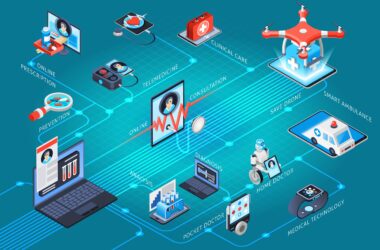The healthcare supply chain forms the backbone of patient care. It’s a complex network responsible for ensuring the timely and efficient delivery of vital medical supplies, pharmaceuticals, and equipment to hospitals, clinics, and other healthcare providers. However, this intricate system faces numerous challenges, including inefficiencies, human error, and rising costs. Fortunately, a new wave of innovation is poised to revolutionize how we manage healthcare logistics: Healthcare GenAI (Generative AI).
A report by Fortune Business Insights predicts that the global supply chain management market in healthcare is expected to experience significant growth, with a projected increase from $3.43 billion in 2024 to $10.65 billion by 2032, representing a CAGR of 15.2%. This rapid growth signifies the increasing demand for efficient logistics solutions in the healthcare sector. These growing complexities and rising costs necessitate innovative approaches to optimize the flow of medical supplies and ensure patient well-being. Enter Healthcare GenAI, a robust tool with the potential to transform the healthcare supply chain landscape.
The Current Landscape Of The Healthcare Supply Chain
The healthcare supply chain encompasses many key stages: procurement, inventory management, distribution, and logistics. At each stage, there’s a window for disruptions. Procurement involves sourcing and purchasing medical supplies, often complicated by fluctuating demand and limited vendor visibility. Inventory management requires careful balancing of stock levels to prevent stockouts while limiting storage costs of expired products. Distribution and logistics include the physical movement of supplies, which is susceptible to delays and human error during picking, packing, and transportation.
These challenges, which we must address urgently, have a significant impact on patient care. Stockouts can lead to delayed procedures and frustrated providers. Inefficiencies inflate healthcare costs, ultimately impacting patient access to essential treatments. The growing demand for medical supplies, coupled with the rising complexity of healthcare logistics, necessitates innovative solutions.
Artificial Intelligence (AI) Revolutionizing Supply Chain Management
AI is rapidly transforming diverse industries, and healthcare supply chain management is no exception. AI code assistants, powered by machine learning and automation capabilities, are emerging as a powerful tool to streamline logistics and optimize resource allocation.
One key trend is the automation of repetitive tasks. Consider a scenario where AI handles routine tasks like order processing, invoice reconciliation, and inventory management. This frees up valuable time for human staff to focus on strategic planning and exception handling, leading to a more efficient workflow.
Predictive analytics is yet another area where AI shines. AI code assistants can analyze historical data on usage patterns and predict future demand for medical supplies. This allows healthcare providers to anticipate shortages and place proactive orders, ensuring essential supplies are readily available when needed. Furthermore, AI can identify trends in patient demographics and treatment protocols to adapt purchasing strategies and optimize inventory levels.
Machine learning empowers AI code assistants to learn and improve their performance continuously. As AI systems process more data over time, they become adept at identifying patterns and anomalies in the supply chain. This allows for more precise demand forecasting, improved inventory optimization, and even the potential for AI-powered recommendations to enhance procurement strategies.
[Also Read: Advancing Healthcare With AI-Powered Inventory Management]Role Of AI Code Assistants Transforming Healthcare Logistics
Now, let’s delve into the specific ways AI code assistants are transforming healthcare logistics:
Smart Procurement: AI can analyze historical data on usage patterns and predict potential shortages. This allows for automated purchase orders to be generated when stock levels reach predefined thresholds, ensuring a consistent flow of essential supplies. Additionally, AI can analyze vendor performance data and identify cost-effective sourcing options, optimizing procurement processes.
Inventory Optimization: Gone are the days of relying solely on intuition for inventory management. AI can analyze real-time data on usage and predict future demand, allowing healthcare providers to maintain optimal stock levels. This minimizes the risk of stockouts while reducing storage costs associated with holding excess inventory.
Real-Time Tracking and Visibility: AI can track the movement of medical supplies throughout the supply chain in real time. This provides healthcare providers with greater visibility into their inventory, allowing them to identify potential delays and proactively address any logistical issues. Real-time tracking also facilitates better communication with suppliers and distributors, ensuring timely deliveries and a more responsive supply chain.
Improved Communication and Collaboration: AI can streamline communication between healthcare providers, distributors, and manufacturers. Imagine an AI-powered platform that facilitates seamless data sharing and order tracking across the entire supply chain network. This fosters collaboration and enhances overall supply chain efficiency.
Fraud Detection: AI can be an essential tool for identifying and preventing fraudulent activities within the healthcare supply chain. By analyzing purchase patterns and identifying anomalies, AI can flag suspicious orders for further investigation, potentially saving healthcare organizations significant financial losses.
The Future of AI In Healthcare Supply Chain Management
The future of AI in healthcare supply chain management holds immense promise. Here are some potential advancements on the horizon:
Integration with IoT: The Internet of Things integrates various devices and sensors, generating a wealth of real-time data. Integrating AI with IoT technology can provide even greater visibility into supply chain conditions. Imagine AI analyzing data from smart sensors in warehouses to optimize storage conditions and prevent stock spoilage.
Blockchain and Secure Data Sharing: Blockchain technology offers a secure and transparent way to share data across the supply chain. This can enhance trust and collaboration between stakeholders, while also mitigating the risk of data breaches. With secure data sharing facilitated by AI, healthcare organizations can benefit from improved traceability of medical supplies and streamlined regulatory compliance processes.
AI-powered Robotics: Advancements in robotics coupled with AI can automate tasks in warehouses and distribution centers. Imagine AI-powered robots handling picking, packing, and transportation of medical supplies, significantly reducing the risk of human error and improving overall logistics efficiency.
Disruptive Healthcare Innovation And AI Risk Management
The integration of AI code assistants undoubtedly represents a disruptive healthcare innovation. However, with any new technology, it’s crucial to consider potential risks. Here are two key areas to address:
AI Bias: Like any machine learning system, AI code assistants are susceptible to bias in the data they are trained on. This can lead to skewed predictions and potentially impact procurement decisions. Healthcare organizations must be vigilant about mitigating AI bias by ensuring the training data used is diverse and representative of real-world scenarios.
Explainability and Transparency: AI systems can sometimes arrive at conclusions through complex algorithms that are difficult for humans to understand. This lack of clarity can be a concern, particularly in critical healthcare decisions. Implementing explainable AI (XAI) techniques can help ensure that AI-driven recommendations are clear, logical, and auditable by human experts.
By proactively addressing these concerns, healthcare organizations can leverage the power of AI code assistants while strengthening AI risk management.
Summary
Healthcare GenAI is poised to revolutionize the healthcare supply chain. AI code assistants offer several benefits, from automating repetitive tasks to optimizing inventory management and predicting future demand. As AI technology evolves, we can expect even greater advancements in real-time tracking, secure data sharing, and AI-powered robotics, further streamlining logistics and enhancing patient care delivery.
Is your healthcare organization saturated to embrace the future of AI in supply chain management? Remember, the efficient and cost-effective delivery of essential medical supplies is crucial for ensuring quality patient care. By embracing Healthcare GenAI, you can contribute to a more responsive, resilient, and, ultimately, patient-centric healthcare ecosystem.














